- Home
- Nicholas Sparks
The Wedding Page 14
The Wedding Read online
Page 14
I had come to crave the quiet of the mornings. There were few cars out at this hour, and my senses seemed heightened. I could hear my breath, feel the pressure as my feet moved over the asphalt, watch the dawn as it unfolded--at first a faint light on the horizon, an orange glow over the treetops, then the steady displacement of black by gray. Even on dreary mornings, I found myself looking forward to my walks and wondering why I'd never exercised like this before.
My walk usually took forty-five minutes, and toward the end, I slowed my pace to catch my breath. There was a thin sheen of sweat on my forehead, but it felt good. Noticing the kitchen light at my house was already on, I turned into our driveway with an eager smile.
As soon as I pushed through the front door, I caught the aroma of bacon wafting from the kitchen, a scent that reminded me of our earlier life. When there were children in the house, Jane usually prepared a family breakfast, but our differing schedules in recent years had brought them to an end. It was yet another change that had somehow overtaken our relationship.
Jane poked her head around the corner as I padded through the living room. She was already dressed and wearing an apron.
"How'd your walk go?" she asked.
"I felt pretty good," I said, "for an old guy, that is." I joined her in the kitchen. "You're up early."
"I heard you leave the bedroom," she said, "and since I knew there was no way I'd fall asleep again, I decided to get up. Want a cup of coffee?"
"I think I need some water first," I said. "What's for breakfast?"
"Bacon and eggs," she said, reaching for a glass. "I hope you're hungry. Even though we ate so late last night, I was still hungry when I got up." She filled the glass from the tap and handed it to me. "Must be nerves," she said with a grin.
As I took the glass, I felt her fingers brush mine. Perhaps it was just my imagination, but her gaze seemed to linger on me a little longer than usual. "Let me go shower and throw on some clean clothes," I said. "How much longer till breakfast is ready?"
"You've got a few minutes," she said. "I'll get the toast going."
By the time I came back downstairs, Jane was already serving up at the table. I sat next to her.
"I've been thinking about whether or not to stay overnight," she said.
"And?"
"It'll depend on what Dr. Barnwell says when he calls. If he thinks Daddy's doing well, I might as well head on to Greensboro. If we don't find a dress, that is. Otherwise I'll just have to make the drive tomorrow anyway. But I'll have my cell phone in case anything happens."
I crunched on a piece of bacon. "I don't think you'll need it. Had he taken a turn for the worse, Dr. Barnwell would have called already. You know how much he cares for Noah."
"I'm still going to wait until I talk to him, though."
"Of course. And as soon as visiting hours start, I'll head in to see Noah."
"He'll be grouchy, you know. He hates hospitals."
"Who doesn't? Unless you're having a baby, I can't imagine anyone liking them."
She buttered her toast. "What are you thinking about doing with the house? Do you really think there'll be enough room for everyone?"
I nodded. "If we get the furniture out, there should be plenty of room. I figured we'd just store it in the barn for a few days."
"And you'll hire someone to move it all?"
"If I have to. But I don't think I'll need to. The landscaper has a fairly large crew coming. I'm sure he won't mind if they take a few minutes to help me."
"It'll be kind of empty, won't it?"
"Not once we have the tables inside. I was thinking of setting up the buffet line next to the windows, and we can leave an area open for dancing right in front of the fireplace."
"What dancing? We don't have any music arranged."
"Actually, that was on my agenda for today. Along with getting the cleaners set up and dropping off the menu at the Chelsea, of course."
She tilted her head, scrutinizing me. "You sound like you've put a lot of thought into this."
"What do you think I was doing this morning while I was walking?"
"Panting. Wheezing. The usual."
I laughed. "Hey, I'm actually getting in fairly good shape. I passed someone today."
"The old man in the walker again?"
"Ha, ha," I said, but I was enjoying her high spirits. I wondered if it had anything to do with the way she'd looked at me the night before. Whatever the reason, I knew I wasn't imagining it. "Thanks for making breakfast, by the way."
"It's the least I could do. Considering the fact that you've been such a big help this week. And you've made dinner twice."
"Yes," I agreed, "I have been quite the saint."
She laughed. "I wouldn't go that far."
"No?"
"No. But without your help, I would have been insane by now."
"And hungry."
She smiled. "I need your opinion," she said. "What do you think about something sleeveless for this weekend? With a cinched waist and a medium train?"
I brought my hand to my chin and considered this. "Sounds okay," I said. "But I think I'd look better in a tuxedo."
She tossed me a look of exasperation, and I raised my hands in mock innocence.
"Oh, for Anna," I said. Then, mimicking what Noah had said, I went on, "I'm sure she'll be beautiful no matter what she wears."
"But don't you have an opinion?"
"I don't even know what a cinched waist is."
She sighed. "Men."
"I know," I said, imitating her sigh. "It's a wonder how we function in society at all."
Dr. Barnwell called the house a little after eight. Noah was fine, and they expected to release him later that day or, at the latest, the next. I breathed a sigh of relief and put Jane on the phone. She listened as he went over the same information. After hanging up, she called the hospital and spoke to Noah, who prodded her to go with Anna.
"Looks like I might as well pack," she said as she hung up.
"Might as well."
"Hopefully, we'll find something today."
"But if not, just enjoy your time with the girls. This only happens once."
"We've still got two more kids to go," she said happily. "This is only the beginning!"
I smiled. "I hope so."
An hour later, Keith dropped Anna off at the house, small suitcase in hand. Jane was still upstairs gathering her things, and I opened the front door as Anna was coming up the walk. Surprise of surprises, she was dressed in black.
"Hi, Daddy," she said.
I stepped onto the porch. "Hey, sweetheart. How are you?"
Putting down her suitcase, she leaned in and gave me a hug.
"I'm fine," she said. "This is actually a lot of fun. I wasn't so sure about it in the beginning, but it's been great so far. And Mom's been having a blast. You should see her. I haven't seen her this excited in a long time."
"I'm glad," I said.
When she smiled, I was struck anew by how grown-up she looked. Moments ago, it seemed, she'd been a little girl. Where had the time gone?
"I can't wait for this weekend," she whispered.
"Neither can I."
"Will you have everything ready at the house?"
I nodded.
She peeked around. Seeing her expression, I already knew what she was going to ask.
"How are you and Mom doing?"
She'd first asked me this a few months after Leslie had moved out; in the past year, she'd done so more frequently, though never when Jane was around. At first I'd been puzzled; lately I'd come to expect it.
"Good," I said.
This was, by the way, the answer I always gave, though I knew that Anna didn't always believe me.
This time, however, she searched my face, and then, surprising me, she leaned in and hugged me again. Her arms were tight around my back. "I love you, Daddy," she whispered. "I think you're great."
"I love you, too, sweetheart."
"Mom's a lu
cky lady," she said. "Don't ever forget that."
"Okay," Jane said as we stood in the drive. "I guess that's it."
Anna was waiting in the car.
"You'll call, right? I mean, if anything comes up."
"I promise," I said. "And say hey to Leslie for me."
As I opened the car door for her, I could already feel the heat of the day bearing down on me. The air was thick and heavy, making the homes up the street look hazy. Another scorcher, I thought.
"Have a good time today," I said, missing her already.
Jane nodded and took a step toward the open door. Watching her, I knew she could still turn the head of any man. How had I become middle-aged while the ravages of time ignored her? I didn't know and didn't care, and before I could stop them, the words were already out.
"You're beautiful," I murmured.
Jane turned back with a look of faint surprise. By her expression, I knew she was trying to figure out whether she'd heard me correctly. I suppose I could have waited for her to respond, but instead I did what was once as natural to me as breathing. Moving close before she could turn away, I kissed her gently, her lips soft against my own.
This wasn't like any of the other kisses we'd shared recently, quick and perfunctory, like acquaintances greeting each other. I didn't pull back and neither did she, and the kiss took on a life of its own. And when we finally drew apart and I saw her expression, I knew with certainty that I'd done exactly the right thing.
Chapter Eleven
I was still reliving the kiss in the driveway when I got in the car to start my day. After swinging by the grocery store, I drove to Creekside. Instead of heading straight to the pond, however, I entered the building and walked to Noah's room.
As always, the smell of antiseptic filled the air. Multicolored tiles and wide corridors reminded me of the hospital, and as I passed the entertainment room, I noticed that only a few of the tables and chairs were occupied. Two men were playing checkers in the corner, another few were watching a television that had been mounted on the wall. A nurse sat behind the main desk, her head bent, impervious to my presence.
The sounds of television followed me as I made my way down the hall, and it was a relief to enter Noah's room. Unlike so many of the guests here, whose rooms seemed largely devoid of anything personal, Noah had made his room into something he could call his own. A painting by Allie--a flowering pond and garden scene reminiscent of Monet--hung on the wall above his rocking chair. On the shelves stood dozens of pictures of the children and of Allie; others had been tacked to the wall. His cardigan sweater was draped over the edge of the bed, and in the corner sat the battered rolltop desk that had once occupied the far wall of the family room in their home. The desk had originally been Noah's father's, and its age was reflected in the notches and grooves and ink stains from the fountain pens that Noah had always favored.
I knew that Noah sat here frequently in the evenings, for in the drawers were the possessions he treasured above all else: the hand-scripted notebook in which he'd memorialized his love affair with Allie, his leather-bound diaries whose pages were turning yellow with age, the hundreds of letters he'd written to Allie over the years, and the last letter she ever wrote to him. There were other items, too--dried flowers and newspaper clippings about Allie's shows, special gifts from the children, the edition of Leaves of Grass by Walt Whitman that had been his companion throughout World War II.
Perhaps I was exhibiting my instincts as an estate lawyer, but I wondered what would become of the items when Noah was finally gone. How would it be possible to distribute these things among the children? The easiest solution would be to give everything to the children equally, but that posed its own problems. Who, for instance, would keep the notebook in their home? Whose drawer would house the letters or his diaries? It was one thing to divide the major assets, but how was it possible to divide the heart?
The drawers were unlocked. Although Noah would be back in his room in a day or two, I searched them for the items he would want with him at the hospital, tucking them under my arm.
Compared to the air-conditioned building, the air outside was stifling, and I started to perspire immediately. The courtyard was empty, as always. Walking along the gravel path, I looked for the root that had caused Noah's fall. It took a moment for me to find it, at the base of a towering magnolia tree; it protruded across the path like a small snake stretching in the sun.
The brackish pond reflected the sky like a mirror, and for a moment I watched the clouds drifting slowly across the water. There was a faint odor of brine as I took my seat. The swan appeared from the shallows at the far end of the pond and drifted toward me.
I opened the loaf of Wonder Bread and tore the first piece into small bits, the way Noah always did. Tossing the first piece into the water, I wondered whether he'd been telling the truth in the hospital. Had the swan stayed with him throughout his ordeal? I had no doubt he saw the swan when he regained consciousness--the nurse who found him could vouch for that--but had the swan watched over him the whole time? Impossible to know for sure, but in my heart I believed it.
I wasn't willing, however, to make the leap that Noah had. The swan, I told myself, had stayed because Noah fed and cared for it; it was more like a pet than a creature of the wild. It had nothing to do with Allie or her spirit. I simply couldn't bring myself to believe that such things could happen.
The swan ignored the piece of bread I'd thrown to it; instead it simply watched me. Strange. When I tossed another piece, the swan glanced at it before swinging its head back in my direction.
"Eat," I said, "I've got things to do."
Beneath the surface, I could see the swan's feet moving slowly, just enough to keep it in place.
"C'mon," I urged under my breath, "you ate for me before."
I threw a third piece into the water, less than a few inches from where the swan floated. I heard the gentle tap as it hit the water. Again, the swan made no move toward it.
"Aren't you hungry?" I asked.
Behind me, I heard the sprinklers come on, spurting air and water in a steady rhythm. I glanced over my shoulder toward Noah's room, but the window only reflected the sun's glare. Wondering what else to do, I threw a fourth piece of bread without luck.
"He asked me to come here," I said.
The swan straightened its neck and ruffled its wings. I suddenly realized that I was doing the same thing that provoked concern about Noah: talking to the swan and pretending it could understand me.
Pretending it was Allie?
Of course not, I thought, pushing the voice away. People talked to dogs and cats, they talked to plants, they sometimes screamed at sporting events on the television. Jane and Kate shouldn't be so concerned, I decided. Noah spent hours here every day; if anything, they should worry if he didn't talk to the swan.
Then again, talking was one thing. Believing it was Allie was another. And Noah truly believed it.
The pieces of bread that I'd thrown were gone now. Waterlogged, they'd dissolved and sunk beneath the surface, but still the swan continued to watch me. I threw yet another piece, and when the swan made no move toward it, I glanced around to make sure that no one else was watching. Why not? I finally decided, and with that, I leaned forward.
"He's doing fine," I said. "I saw him yesterday and talked to the doctor this morning. He'll be here tomorrow."
The swan seemed to contemplate my words, and a moment later, I felt the hairs on the back of my neck rise as the swan began to eat.
At the hospital, I thought I'd entered the wrong room.
In all my years with Noah, I'd never seen him watch television. Though he had one in his home, it had been primarily for the children when they were young, and by the time I came into their lives, it was seldom turned on. Instead, most evenings were spent on the porch, where stories were told. Sometimes the family sang as Noah played guitar; other times they simply talked over the hum of crickets and cicadas. On cooler evenings, Noa
h would light a fire and the family would do the same things in the living room. On other nights, each of them would simply curl up on the couch or in the rocking chairs to read. For hours, the only sounds were of pages turning as all escaped into a different world, albeit in proximity to one another.
It was a throwback to an earlier era, one that cherished family time above all, and I looked forward to those evenings. They reminded me of those nights with my father as he worked on his ships and made me realize that while television was regarded as a form of escape, there was nothing calming or peaceful about it. Noah had always managed to avoid it. Until this morning.
Pushing open the door, I was assaulted by the noise of the television. Noah was propped up in bed and staring at the screen. In my hand were the items I'd brought with me from his desk.
"Hello, Noah," I said, but instead of responding with his usual greeting, he turned toward me with a look of incredulity.
"C'mere," he said, motioning toward me, "you won't believe what they're showing right now."
I moved into the room. "What are you watching?"
"I don't know," he said, still focused on the screen. "Some kind of talk show. I thought it would be like Johnny Carson, but it's not. You can't imagine what they're talking about."
My mind immediately conjured up a series of vulgar programs, the kind that always made me wonder how their producers could sleep at night. Sure enough, the station was tuned to one of them. I didn't need to know the topic to know what he'd seen; for the most part, they all featured the same disgusting topics, told as luridly as possible by guests whose single goal, it seemed, was to be on television, no matter how degraded they were made to look.
"Why would you choose a show like that?"
"I didn't even know it was on," he explained. "I was looking for the news, then there was a commercial, and this came on. And when I saw what was going on, I couldn't help but watch. It was like staring at an accident on the side of the highway."
I sat on the bed beside him. "That bad?"
"Let's just say I wouldn't want to be young these days. Society's going downhill fast, and I'm glad that I won't be around to see it crash."
I smiled. "You're sounding your age, Noah."
"Maybe, but that doesn't mean I'm wrong." He shook his head and picked up the remote. A moment later, the room was quiet.

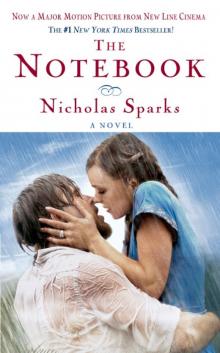 The Notebook
The Notebook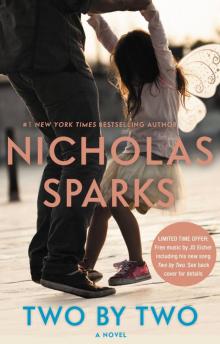 Two by Two
Two by Two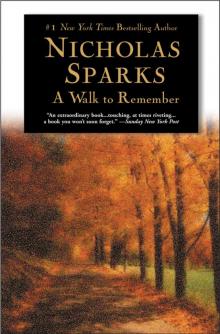 A Walk to Remember
A Walk to Remember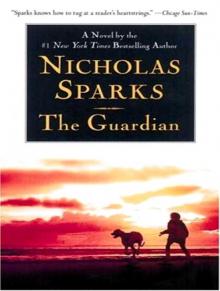 The Guardian
The Guardian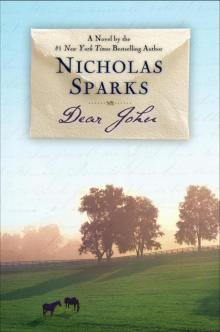 Dear John
Dear John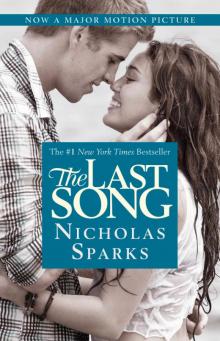 The Last Song
The Last Song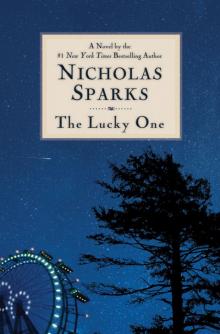 The Lucky One
The Lucky One The Wedding
The Wedding The Longest Ride
The Longest Ride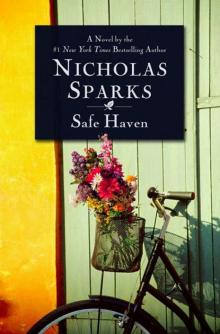 Safe Haven
Safe Haven The Rescue
The Rescue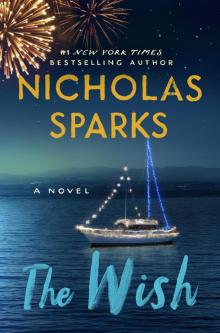 The Wish
The Wish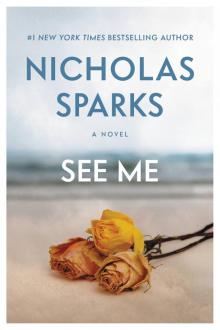 See Me
See Me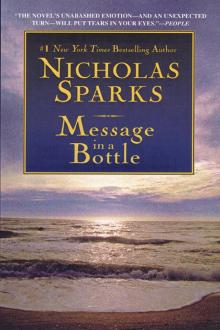 Message in a Bottle
Message in a Bottle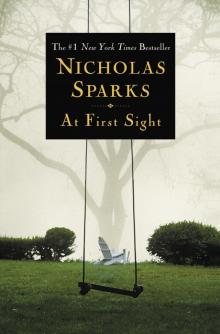 At First Sight
At First Sight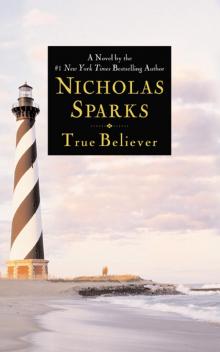 True Believer
True Believer The Return
The Return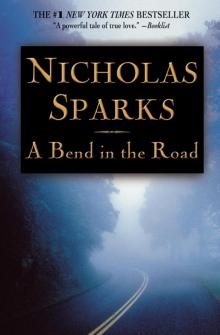 A Bend in the Road
A Bend in the Road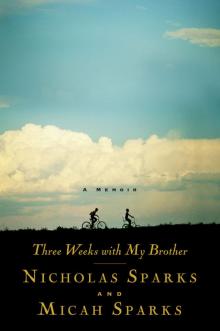 Three Weeks With My Brother
Three Weeks With My Brother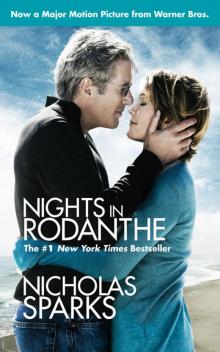 Nights in Rodanthe
Nights in Rodanthe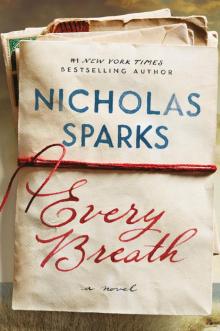 Every Breath
Every Breath